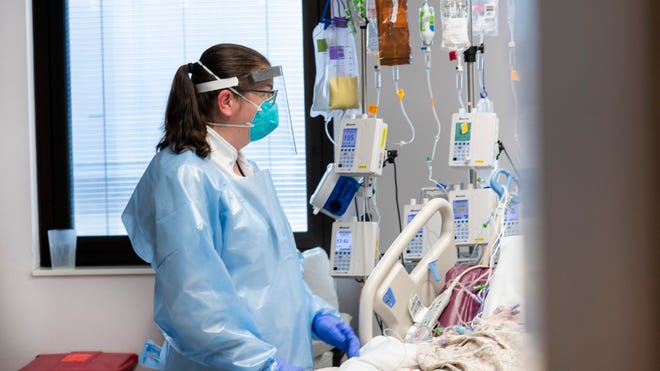
Today's update on COVID-19 in the Cincinnati region shows as local hospitals continue to see increasing numbers of COVID-19 patients.
The number of new cases per 100,000 residents, as measured by a seven-day moving average, eased slightly in most local counties on Wednesday, although the number of cases remains at or near the levels at this time in 2020.
COVID tests:Here's where you can get a COVID-19 test in the Greater Cincinnati area ahead of the holidays
A more contagious but less dangerous variant of the novel coronavirus has been found in Cincinnati, city health officials said Tuesday. The omicron variant also has been found in cases from Campbell and Kenton counties.
What's happening in Cincinnati hospitals
As of Wednesday, the last date for which data is publicly available, the Cincinnati region's 40 hospitals had the highest number of COVID-19 cases since January with 647 patients (179 in intensive care and 131 on ventilators). Of the region's 513 intensive care beds, 104% were full, according to the Health Collaborative's Situational Dashboard. That means that 20 additional beds had to be converted into ICU beds. Meanwhile; 97% of the region's roughly 2,500 medical-surgical beds were full.

What's happening with infections?
The rate at which the novel coronavirus is reproducing locally indicates there is community spread of the contagion.
The situational dashboard reports the R naught, a value that measures spread, for the region and individual areas of it.
Omicron: How its symptoms differ from a cold or the flu
The percentage of positive COVID-19 test results in the area is 10.8%, the highest level since September. Positivity rates were highest for people aged 30-39. The data does not include home tests.

What's the local death toll since the COVID pandemic started?
A total of 4,406 residents of the 16-county region have been reported as dying of COVID-19, an Enquirer analysis shows. A total of 355,006 cases of the illness have been reported. That number may not reflect the full picture because some people have had the disease more than once – and an untold number of infections aren't in the total because they were discovered by people using in-home tests and were not reported to health officials.
Source link








